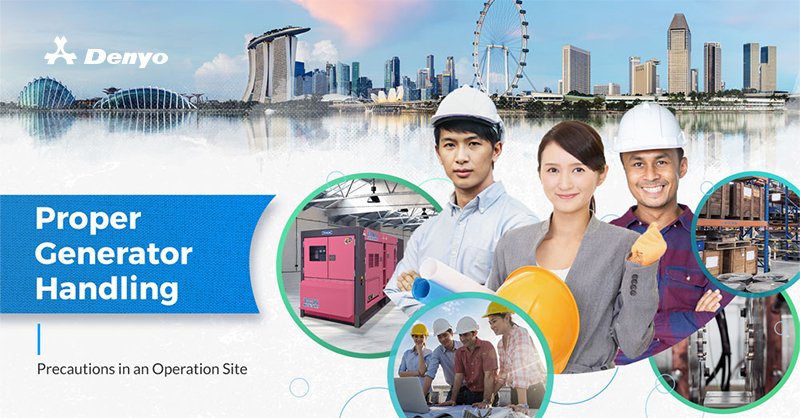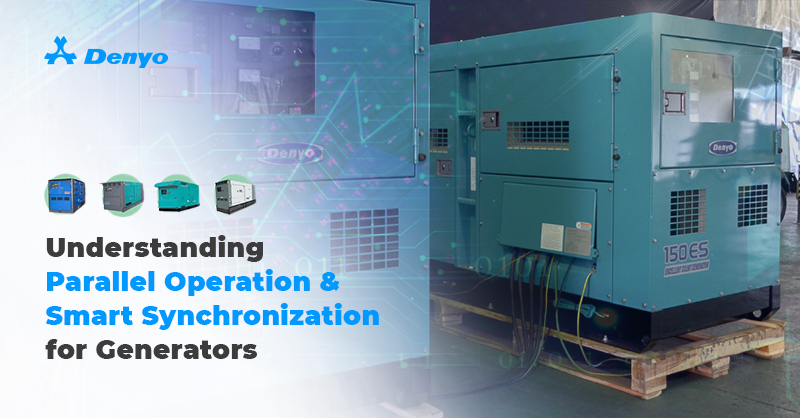Proper Generator Handling – Precautions in an Operation Site

Proper generator handling is critical in ensuring safety and operational efficiency across various settings, from construction sites to outdoor events. While generators are invaluable for providing power in challenging conditions, improper handling of generators can lead to severe risks and hazards, including accidents, equipment damage, or costly downtime. Understanding and adhering to proper generator handling is essential for minimizing these risks.
In this blog, we will cover the five fundamental principles of proper generator handling. By following these guidelines, you can protect your personnel and equipment, ensuring that your generator operates safely and reliably in an operation site.

Ample Space For Generator Inspection and Maintenance
Proper spacing between generators is essential for ensuring safe and efficient operations, especially when multiple units are installed. When adequate space is provided between generators, operators can easily access each unit for routine inspections and maintenance.
Furthermore, ample spacing reduces the risk of accidents, such as collisions or injuries, that can occur in cramped or overcrowded setups. It also enables operators to move freely and work in an organized manner, addressing potential issues that may escalate into major problems and maintaining the efficiency and reliability of the generators.

Avoid Flammables or Flammable Substances around the Generator
Generators, by nature, produce heat and can emit sparks during operation, making them a potential ignition source for nearby flammable materials. When flammable substances, such as fuel, are placed too close to a generator, the risk of fire or explosion increases dramatically. Such incidents can lead to severe injuries, death, and extensive property damage.
Ensuring all flammable materials are kept at a safe distance and establishing a secure perimeter around the generator can prevent these accidents. Regular inspections should be conducted to ensure that the area around the generator remains free of any potential hazards, thereby safeguarding both the equipment and the people working nearby.

Stable and Even Ground Conditions
The foundation of the operation site should always be stable and even, and there should be no immersion of water such as rainwater. Operation efficiency will be jeopardised if the generator is immersed in rainwater as it could pose a risk of electrocution and shocks to people in the surroundings.
When operating on unstable ground, the generator vibrates and may result in loose bolts/nuts, fuel leakage, and broken wires. All these issues could cause generator malfunctions and even lead to a serious accident.

Suitable Operating Environment
There are environments to avoid when planning for operation location. Choosing an environment with less humidity and dust is important because generators exposed to high-humidity climatic conditions could adversely affect the performance and drastically reduce the generator's designed lifespans.
Operation in a corrosive gas atmosphere should be avoided as corrosive action will occur to vital components and damage the generator, resulting in reduced lifecycles and unscheduled downtime.

Ensure the Generator is Adequately Ventilated
Since a generator produces electricity with an internal combustion engine run on a fuel source, it produces undesirable emissions for people. In particular, carbon monoxide (CO) is colourless and odourless, making it extremely difficult to detect. Most people suffer from carbon monoxide poisoning without even realising it, and this occurs mainly because the generator has not been adequately ventilated.
Always ensure a generator is adequately ventilated by never running it indoors or in enclosed areas. If operating in a tunnel, the exhaust pipe must be extended to a ventilated place where emissions can be emitted to increase ventilation and prevent CO build-up.
Conclusion
Proper generator handling plays a crucial role in ensuring the safety of both personnel and equipment. Not only do these procedures significantly reduce the risk of accidents, but they also enhance the efficiency and longevity of your generators.
In summary, a safe operation site prevents accidents and ensures operation efficiency. If you have any questions or need assistance with generator handling, please do not hesitate to contact us.


